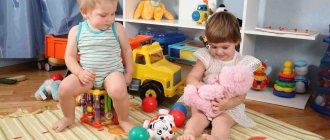The family is the first social institution in a child’s life. The basics of personality laid down by the family in the first years of life will not be changed or replaced by either kindergarten or school in the future. What a person is like in adulthood is largely the result of family upbringing. Which styles and types of family upbringing create geniuses and which create criminals? Is there such a connection at all? And is there a “counterbalance” to family education? Let's figure it out.
“A child can be nurtured without love, but education devoid of love and human warmth will never succeed in making him an independent person.” - Donald Winnicott.
Primary socialization of the child as the main function of the family
In psychological terms, the family determines the primary socialization of the child. Kindergarten, school, university – secondary socialization. Naturally, the primary is more important. It lays down the basic ways an individual reacts to problems, behavior patterns, and attitudes. What is meant by primary socialization:
- mastering language and emotional structure;
- mastering the basic value norms and meaningful ideas of society.
The purpose of primary socialization in the family is to form in the child social responsibility and the ability to subordinate the individual to the general.
A child's socialization goes through imitation and identification.
- Through imitation, the child learns elements of culture, skills, traditions, and rituals. But for imitation, that is, imitation, there must be an example. And these are the parents.
- Identification is the acceptance of norms and beliefs as one’s own (or non-acceptance). At this stage, all is not lost. And even if the family is dysfunctional, but the child is influenced more favorably from the outside, he may not accept the example of his parents. A clear example: in a family of alcoholics, children usually have two scenarios: to repeat the image of their parents or, on the contrary, to categorically not accept alcohol. There is very rarely a middle ground.
When family members fail to fulfill their responsibilities and rights, disharmony occurs in the family. Due to disharmony – dysfunction. When the family and other institutions of public education are dysfunctional, maladaptation of the child and social maladjustment arise as a mass phenomenon. This in turn leads to desocialization, which is what is observed in modern society.
Liberal model: characteristics
- Freedom. Adults adhere to the slogan: “Freedom is everything.” Therefore, they take absolutely no part in raising their child. He has no restrictions. He does what he wants. The main thing is to be happy. Only such absolute freedom is more reminiscent of permissiveness, which leads to anarchy.
- Equality. There is no pressure or manifestation of power, each family member is in the same conditions. Everyone is equal to each other.
- Lack of control. The baby gets the experience he needs. Therefore, if he wants to learn something, he must come to this decision himself and figure out how he can gain knowledge and skills. That is, there is no control over his actions. He climbed somewhere, which means he needs to satisfy his curiosity and no one will interfere with this process. Therefore, this style of parenting is also called permissive.
- Lack of support. Are there any difficulties or problems? Decide for yourself, gain experience. No one will fuss and correct other people's mistakes.
- Adoption. Adults do not place any hopes on their child. They accept him as he is. Do you want to be a cleaner, and not like dad, a business manager? Well, please, it’s your right, since you see your calling in this profession.
- Confidence. You can discuss any topic without fear of being scolded or denied information on any issue. Again, thanks to acceptance, he may seem imperfect, with a lot of shortcomings, but at the same time he will still remain a beloved son or daughter. Without experiencing rejection or devaluation, which inspires a lot of trust.
Educational potential of the family
The family is the link between the child and society and other social institutions. Moral standards, rules, morality are laid down in the family, moreover, in the first 5 years of a child’s life. Such universal human values as honesty, justice, kindness, loyalty, generosity, selflessness, etc. are formed.
Otherwise, selfish behavior and destructive aspirations (aggression, hostility, anger, hatred) may develop. Ultimately this will probably lead to immoral behavior. Then the person will pose a danger to society and himself. Therefore, the value of family education is limitless for society.
As part of family education, the following is carried out:
- patriotic;
- ethnocultural;
- aesthetic;
- moral;
- physical;
- sex and gender education.
The family is the first pedagogical system into which a child finds himself. Moreover, he is constantly in this system. This means that every parent’s action, word, gesture has educational significance. Family education is carried out constantly, every day, within the framework of the shared life of children and parents.
This is the uniqueness of family education: its continuity and duration, its more emotional nature and lasting influence.
In the modern world there is a decline in the educational potential of the family. There are several reasons for this:
- lack of time for upbringing due to excessive workload of parents;
- lack of time spent together and communication between children and parents;
- the growing value gap between generations, and as a consequence - their alienation;
- increasing the influence of external unfavorable factors on the microclimate in the family.
As a result, the relationship between parents and children suffers quantitatively and qualitatively. Firstly, there is a lack of time together. Secondly, there is a lack of understanding and trust in the relationship.
The personal characteristics of the parents also have a significant impact on the family. Negatively affects:
- instability, inconsistency of personality;
- inadequate self-esteem;
- diffidence;
- egocentrism;
- accentuated character traits;
- excessively expressed nature of processing of feelings and experiences;
- inflexibility of thinking.
The attitude of the parents towards the child will determine the attitude of the child towards himself later.
If you have a child, then, of course, you raise him, or at least try to do so, and what happens is the second question. This means that after reading the characteristics of the types of family upbringing and seeing in them something similar (different degrees of similarity) in the style of your upbringing, you can predict what kind of person you will raise your child to be. If it turns out that the results are not at all what you want, then there is only one answer - change the tactics of your relationship with your child.
The first option of upbringing is when parents, when communicating with a child, are very inconsistent in their expression of feelings, speculate on affection and rewards, building relationships based on benefits. Trying to foster a practical approach to life (getting benefits as one of the principles), parents thereby stimulate sycophancy and servility, that is, the child will consider this type of behavior to be the norm in the future. As for freedom, the child is given complete and uncontrolled freedom of action. However, as for adult activities, the child is involved in them regardless of whether he wants it or not. At the same time, parents show indifference (due to their busyness or simply do not attach importance) to their children's needs and requests. On the one hand, leaving the child to his own devices, they do not teach him to reason; the child’s mental activity is aimed more at searching for various pleasures, as well as at developing ways to “get out” of the situation and avoid responsibility. If we consider the education of value orientations, then again two sides appear, one of which is permission to act as you please or as is more profitable. On the other hand, mandatory observance of the rules of decency and norms of behavior in society is required, and these norms are not explained (why should one behave one way and not another), but are learned by heart.
A necessary element of education is encouragement and punishment for actions and intentions. In this version of upbringing, inconsistency is manifested - at the same time, parents can punish and encourage, and they do not know the measures in either one or the other. Often decisions are made momentarily (without thinking about the consequences) depending on the situation.
In relationships with others, parents show duplicity: in the presence of a child they speak well of a person, but behind their backs they speak badly. They try to extract personal benefit from relationships, do not neglect bribery or deception, and the child is taught the same.
With such a system of permissive upbringing, a person grows up with a conformist personality type. This person will get used to everyone and everything, obeying the majority. Conservatives who are distrustful of strangers, having their own environment where they are not ahead, but not lagging behind. Such people make up the “gray mass” of people, have a banal mindset, are content with the benefits of civilization, and live an ordinary life like everyone else.
The second type of upbringing is based on the crazy love of parents for their child, while he rises to the rank of “super personality.” From an early age, the child is taught etiquette and social behavior. That is, parents pay great attention to appearance, and do not worry about the child’s human qualities. Communicating with a child as an adult, they make the same demands on the child, forgetting that he is still a child. As for activity and development, they always monitor the intellectual development of their child and teach them to demonstrate this intelligence. Active work is encouraged, and the results are always admired, considering them outstanding. Unfortunately, the child is often praised, excessively inflating his self-esteem, which will be accompanied by acute and painful experiences in the event of failures (and all people have them). Also, parents do not teach the child to reflect on the essence of phenomena, focusing more on the fact that positions must be won and never given up.
As already mentioned, with this style of education, much attention is paid to the formal implementation of the rules and norms of etiquette, but it is not explained that this is necessary to maintain human relationships. From a very early age, a child learns that he needs to be able to stand out in society and feel comfortable there. Parents, despite all their love, punish very severely for failure to comply with behavioral norms, although they mostly use incentives when raising children. As you understand, since the assimilation of rules is only formal, without understanding their essence and depth, then in order to achieve his goal such a person, having matured, will step over them.
In the family, parents divide people into useful and useless, equating them with means to achieve a goal. But God forbid someone offends their child - parents always come into conflict with the offender, without understanding who is right and who is wrong, and they will still demand compensation for the harm. The result of this parenting style (some call it competitive) is a person with a dominant personality type. The name speaks for itself. Parents may not be surprised if their adult child periodically responds to their love and care with black ingratitude, because they themselves have taught him to use people.
The next parenting style (let's call it judicious) includes the presence of calm and smooth relationships between equal individuals - parents and children. The dignity of the child is never diminished, and family relationships are kind and warm. From an early age, a child feels like a full member of the family and participates in solving family problems.
The child is given complete freedom of action, attention is paid to the creative development of abilities, and independence is encouraged in attempts to comprehend facts and personal experience. If a child shows interest and curiosity in something, then he is supported, answering all his questions, and not reprimanded. In general, parents tend to talk with the child and encourage active activity in coming up with a variety of games and activities. Satisfy all the child's needs, but do not spoil him.
As for the child’s behavior and actions, parents discuss all misdeeds in order to understand the motives and so that the child can draw conclusions, rather than punish him for them. Such children quickly and easily master the norms of human relationships and try not to harm others, since they have already developed moral qualities to some extent. It is clear that no punitive measures are used in such a family, since the child is already trying to do everything. However, there is also no stimulation of activity, since parents consider this a natural need of any human being, and generally do not reward the child for what he already does with pleasure.
Since childhood, a child can see the benevolent attitude of his parents towards others, attentive, respectful and non-conflicting. The family has many friends and acquaintances, and treats relatives and parents with care. It is in such a family environment that people with a sensitive personality type grow up. These people are quite sociable, but do not like large noisy companies and are attached to their parents. They are sensitive to reproaches and lectures addressed to them. However, these are thoughtful and reasonable people who cannot always stand up for themselves and win a place in the sun.
There is a type of family education in which parents show complete submission to their child and fulfill all his wishes, fearing that he will begin to act up. They are ready to do anything for a child and simply dote on him, at the same time they are very worried about him and fear for his fate, which is why they do not take their eyes off him until adolescence.
Increased attention and guardianship are also manifested in the fact that the child is not allowed to act independently, they are deprived of activity, turning him into a spectator. They themselves entertain the child in every possible way and pamper him. As a result of insufficient independence, the child may experience a delay in the development of abstract thinking, the need to act with objects remains, which also affects the overall development of the child, requiring educational correction.
Parents raise a child within the framework of complete permissiveness, which is why he is indifferent to the principles of morality and ethics. Characteristic is behavior depending on the group in which one is currently located, and situational morality. In general, the child has an egoistic orientation, which will further take root in him. It is clear that there is no punishment for misconduct in such a family, no matter what it is. On the contrary, parents may feel guilty if they are unable to satisfy some of the child’s needs; later, as an adult, he will exploit this, manipulating his parents.
In terms of communication with people around them, parents tend to contact only those who can be useful in some way. The child chooses his own friends, and is jealous of his own choices, until the very end they try to control the entire system of relationships with others. As a consequence of this style of education, a person develops an infantile personality type. This person has poor guidance in life, is not always able to make independent decisions, and does not really think about the ones he makes. He is a self-centered person to the core without any special principles or morals. In solving problematic situations, he hopes for outside help. Shows immaturity of emotions and immaturity to the point of gray hair.
A controlling parenting style involves constantly guiding the child along the right path, according to the parents. They are harsh in their treatment of the child, not showing love (so as not to spoil them), they demand a lot, raising the bar too high. Lacking basic knowledge about the child’s psyche, such parents constantly practice various educational systems, and the child acts as a guinea pig.
The freedom of children from such families is limited, while going beyond the rules is strictly controlled by parents. A feature of this type of education is the pedantry of parents in some matters, for example, in implementing the daily routine. As a result, children develop vain thinking, they quickly grasp information and remember it well, but reproduce it poorly, because they are afraid of making a mistake and being punished for it. Children grow up anxious, and constant bans cause protests.
Constantly trying to catch their child in unseemly acts, parents create self-doubt in him, since the parents themselves are overly concerned about the correctness of his development. In the end, children simply do not understand how to behave, since their parents are unhappy in any case. Then all actions take on a protective coloration.
Family priorities are punishment rather than reward, using a commanding tone. Parents are stingy with affection, support and praise, and tend to justify their cruelty towards their child. It turns out that parents achieve momentary success in education, and not developed norms of behavior.
For some reason, such parents believe that the child is disturbing the people around them, then they make excuses and apologize for him. At the same time, they show aggression, pickiness and criticism of those who behave incorrectly towards their child.
Such methods of education lead to the formation of an anxious personality type in a person. Such people are prone to introversion, which is based on low self-esteem and self-doubt. They do not enter into conflicts and do not always adequately perceive the attitude of others towards themselves, exaggerating its negativity. You won’t envy such people, since the question generally arises: “Do they know how to live a full life and enjoy it?”
The last style of family education that I would like to pay attention to is quite common. In this version, the child is loved, but never pampered. Parents endure all the hardships themselves, without introducing the child to family problems, as if protecting him from overload, while the child absorbs patterns of family behavior.
The characteristic thing is that the child is left to his own devices, because the parents are constantly busy, and therefore the child’s games are an imitation of adult activity. And the child has few toys. Children constantly strive to help their parents and do not develop creatively. Due to the fact that from an early age the child observes those around him, he exhibits high organization in both physical and mental activities. He tends to think things through on his own.
Moral standards in children from such families are formed through friendly relationships; parents do not lecture, but can shame or criticize, more striving to set examples with their behavior. Therefore, no punishments or rewards are applied. If parents have free time, then they devote it to the child, but satisfy the needs based on their capabilities.
Such a family has favorable relationships with others, they are always happy to have friends and acquaintances, without refusing to help them. In general, they consider human relationships to be the greatest value; they are simply grateful to others and do not expect anything from them in return. In such a family, children with an introverted personality type grow up. This means that they live in their own world, where not everyone is allowed. In general, these are quite kind and sociable people, about whom nothing can be said for sure, except that this person is “on his own mind.”
In their pure form, the described styles of family education are not so common, but they are not rare either, you just don’t always see it. But the consequences of upbringing, views on life, on people, on themselves, priorities and attitudes are always very clearly visible - everything that parents laid down throughout the entire educational process, guided by their principles and motives. And there is no need to ask the question: “Who did you go with?”, since the answer is obvious, but parents are not always aware of this.
Tasks of family education
The tasks of family education include the following:
- Creating the most favorable conditions for the spiritual, physical and moral development of the child.
- Ensuring the socio-economic and psychological protection of the child in the family.
- Transferring the experience of creating and maintaining a family, raising children in it.
- Teaching children the necessary skills to care for themselves and loved ones.
- Developing self-esteem.
- Formation of the child’s social activity and social resistance to the negative influence of the environment.
Classification of violations
It is not always possible for parents in a family to adhere to a certain type of upbringing throughout the child’s life. They often make mistakes that come under the close attention of psychologists and are clearly classified. The types of family education disorders can be summarized in the following list:
- binding;
- rejection;
- delegation.
Bonding is characterized by regulated and stereotypical communication that develops between parents and children. Adults comment rather harshly on all the child’s actions, which deprives them of initiative. As a result, they completely refuse to make decisions, become infantile and socially maladapted. This significantly slows down their emotional development.
Rejection causes a child to give up his wants, needs, and overall character. Relations with his parents convince him of the inconsistency of all his actions and their wrongness. In the case of young children, this can lead to autism.
When delegating, parents, consciously or not, transfer their own ambitions and dashed hopes to their children. The child's victories, which are not related to parental ambitions, are completely ignored, and he turns into a puppet. Psychologists say that such a violation in upbringing can affect even an adult and already formed personality. Such young people always live based on the approval or censure of their parents. This connection is almost impossible to break.
Of course, it is very difficult to raise a child without making mistakes and without making annoying mistakes. Every parent dreams of becoming the best for their children, so they are ready to do everything possible to achieve recognition. As psychologists advise, you should not be afraid of mistakes, the main thing is to have time to correct them in time.
Principles of family education
The principles of family education that determine the successful development of the child include:
- humanity (children are easy when they are welcome, and not vice versa);
- openness and trust in relationships;
- sequence of requirements;
- favorable socio-psychological climate in the family;
- inclusion of children in family life;
- help and support of the child in any situation.
Accordingly, the following are considered good conditions for education:
- emotionally positive relationship between spouses;
- love and respect of family members;
- attention and discipline;
- spending time together;
- physical contact with children (hugs, stroking).
What to do when you have problems raising children?
When difficulties arise with the upbringing or behavior of children, it is worth going to an appointment with a family or child psychologist. Moreover, it is advisable for both parents to attend the consultation, because everyone is a participant in the process, and, therefore, his position and behavior need professional analysis.
Disharmonious types of education can and should be improved. It is best to do this in tandem with psychologists and at the earliest possible age of the child, because after 16 years in most cases it is too late.
Disharmonious upbringing of a child in adulthood can manifest itself in the form of addictions, infantilism, neuroses, and various complexes. Therefore, if you have problems, it is important to promptly contact specialists for help.
If you want to solve problems with children and make their upbringing more effective, contact our Center!
Family parenting styles
“Dependence on parents, which is instilled in children as the virtue of obedience to parents, is an expression of unregulated parental power,” Francoise Dolto.
There are 3 main pedagogical styles of parenting in the family. Each of them affects the child in its own way.
Authoritarian
Parents suppress the child and use their power. Children end up growing up gloomy, distrustful and passive.
Conniving
Parents have little involvement with their children. Essentially, he is left to his own devices. Children with such upbringing do not know how to make plans and achieve goals, and are not persistent.
Democratic
Parents contribute to the development of the child, encourage his interests and develop his abilities. Children grow up inquisitive and active in all areas of life, and are independent.
There is a more expanded classification of family parenting styles:
- Family idol. The child is always the center of attention, his slightest whims are satisfied. Permissiveness and praise do not benefit the future personality; the child grows up selfish and with inadequate self-esteem.
- Cinderella. The child lives in conditions of punishment and abuse. He does not receive emotional support. In the future, he will be a quiet, downtrodden person with low self-esteem and, possibly, hidden aggression.
- Overprotection. The child does not have the right to choose; his parents decide everything for him. As a result, he grows up passive and dependent, not ready for independent life.
- Inconsistency and contradiction. It comes in two models: “carrot and stick” or a mismatch between mom and dad’s styles. The child’s personality becomes unstable, duplicity and uncertainty, and internal conflicts develop.
- Hypocustody. Raising a child is left to chance. As a result, the child is raised by the street, the Internet, or someone else. There are many development options, but most of them, unfortunately, are unfavorable.
- Conniving and condescending. Parents do not punish the child or purely formally point out unwanted behavior. In this situation, the child grows up in the belief that “nothing will happen to him.”
- All-round defense. Parents do not listen to outside opinions about the child’s unacceptable behavior; they themselves do not notice it and believe that their child is always right.
- Demonstrative. Parents exaggerately emphasize the “hooligan disposition” of their “tomboy and lack of hearing.” They pretend to be worried, but they themselves are proud of the child’s behavior.
- Pedantically suspicious. Parents show total control and distrust. The child becomes anxious, nervous, and aggressive.
- Severely authoritarian. The child has no right to vote, no choice, and his objections are not accepted. The child grows up shy, withdrawn or aggressive.
- Exhorting. Parents show their position only in words. As a result, they lose authority in the eyes of the child. The child becomes his own master.
- Expanded scope of parental feelings. Parents violate the child’s personal space, want to know everything, and do not leave him any personal secrets. This is fraught with aggression, internal conflicts of the child, and distrust of people.
Overprotection
Overprotection is characterized by total control and distrust towards the child, as a result of which the child does not develop a sense of responsibility, he is weak-willed, all important decisions are made for him by his parents. The formation of such important character traits as initiative, independence and a sense of duty fade into the background.
In the case of a “sick” child, child victims, children are often treated for imaginary illnesses, meaning this is a manifestation of love. Children with this type of upbringing often have various neuroses.
Parental Settings
Parenting style is the attitude towards all children and education as such. Parental position (attitude) – attitude towards a particular child. There are 4 types of parental settings.
Acceptance and love
Parents' catchphrase: “The child is the center of my interests.” Parents spend a lot of time with the child, do things together, and show affection. As a result, the child develops normally and experiences a feeling of closeness with his parents.
Explicit rejection
Catchphrase: “I hate this child, I won’t worry about him.” Parents are inattentive and cruel to the child, avoid contact with him. As a result, the child grows up to be an emotionally undeveloped person, aggressive, and with criminal tendencies.
Excessive demands
Motto: “I don’t want a child the way he is.” Parents find fault with the child, constantly criticize and do not praise. In the future, the child is characterized by frustration and self-doubt.
Overprotectiveness
Motto: “I will do everything for my child, I will devote my life to him.” Education is characterized by excessive indulgences or restrictions on freedom. The child grows up infantile (especially in terms of social relationships) and not independent.
Strict rules - authoritarian approach
Often parents treat their children with great severity, punishing them for the slightest mistakes. The instructions of the mother and father must be strictly followed. The child's point of view is not taken into account. Children are punished for bad behavior without any explanation.
The dictatorial model of upbringing presupposes extremely strict restrictions on the independence of children and a “cold” attitude towards them. Parents believe that this method will allow them to raise an obedient, responsible and efficient person. However, as a rule, the result does not meet expectations.
Using an authoritarian parenting style often has the following consequences:
- Children with a powerful inner core begin to actively rebel, quarrel with their suppressive parents, and strive for independence and freedom at any cost. As teenagers, they often fall into “bad” companies and run away from home, expressing their protest.
- A child with a weak character is afraid of his mother and father, and experiences a strong fear of punishment. In the future, such children become unsure of themselves, overly timid, joyless and withdrawn.
- Some follow the example of their parents and subsequently create families using a well-known parenting model.
Mom and dad who practice dictatorial style should understand that they cannot put pressure on the baby, they need to allow the child to be independent, then he will be able to express himself better.
Characteristic
The authoritarian style is characterized, as mentioned above, by rigidity. It includes such educational tools as coercion, orders, threats, criticism and other manipulations that can cause feelings of fear, shame and necessarily guilt.
The ultimate goal is obedience. So that he understands how wrong and imperfect he is, unlike his parent.
Accordingly, to feel shame and guilt for this, which will stimulate him to meet the expectations of the people who “love” him. Who believe that he is simply devoid of will and the ability to make decisions. Unable to manage their activities and make choices.
Violence is not only physical, sometimes the most complex, causing deep psychological trauma, is directly moral. To cripple another person, you don’t have to beat him, you can simply deprive him of his will and constantly criticize him.
Types of family relationships
If we talk about type, then we are talking about the very relationships between family members: beliefs, attitudes, values. If we talk about style, then this is the purely pedagogical behavior of parents: techniques, methods, methods. The following families can be distinguished by type of upbringing.
Diktat
The name speaks for itself: parents dictate to the child how he needs to live. This type:
- negatively affects the development of the child’s initiative, self-confidence, self-esteem;
- provokes the development of inadequate self-esteem, dissatisfaction of many needs, including higher ones (self-development, self-affirmation, self-realization).
Guardianship
We are talking about excessive parental care for the child. With this type, two outcomes of socialization are possible:
- the child ultimately turns out to be unprepared for life, he is irresponsible, objectively and subjectively disadvantaged;
- the despotic orientation of character is noted.
Non-interference
Parents are indifferent to the child’s life, they have no authority in his eyes and are not a significant group. The consequence is the alienation of the child.
Confrontation
It involves confrontation between parents and child, each side defending its opinion. Consequences of this type: inadequate self-esteem, mechanisms of conflict interaction, negative personality traits (rudeness, scandalousness, cynicism, etc.).
Cooperation
The optimal and desirable type of education for successful socialization. This is interaction, family cooperation, mutual respect.
Indifference (hypoprotection)
If a child does not occupy an important place in the life of his parents, and the formation of his personality is not given due attention, this will have consequences for him in the future. The levels of trust and family value in children of this type of upbringing are, as a rule, significantly underestimated.
The child is left to his own devices. He is not inclined to share his problems and experiences, which can result in alienation, asociality, or various kinds of addictions in adulthood.
With this type of upbringing, children often suffer from psychosomatic illnesses, trying to subconsciously attract the attention of adults to themselves.
Motherly attitude
In particular, I would like to consider the influence of a mother’s relationship with her child on his development. It has been scientifically proven that this connection is the fundamental basis of all human development.
First type
Such mothers easily and quickly adapt to the needs of the child. Their behavior is supportive and permissive. Mothers of this type do not set specific goals, but wait until the child is ripe for something.
Second type
Mothers of the second type try to consciously adapt to the needs of the child, but not always successfully. Because of this, the mother’s behavior becomes tense and the relationship with the child becomes formal. Such mothers are more likely to dominate.
Third type
Mothers behave like mothers only out of duty, they do not experience any feelings. They tightly control the child, show coldness, are very categorical and cold-blooded in matters of teaching something (they do not take into account the development of a particular child).
Fourth type
Mothers are inconsistent in their behavior. They do not adequately address the age and needs of the child. Educational methods and reactions to the child’s behavior are contradictory. They do not understand their child well.
The last type is the most unfavorable for the child; it creates anxiety and uncertainty in the child. The first type is the most favorable. It instills in the child a sense of control over his own life.
Chaotic and indifferent style
In the case of a chaotic style, parents have different opinions regarding the parenting model. Each family member has their own point of view and considers it the only correct one. Often the mother experiences emotional swings.
In such situations, children become uncontrollable and do not take into account parental demands. They suffer from imbalance and do not feel protected. They want to somehow organize the world around them. As adults, they are usually characterized by irresponsibility and childishness.
An indifferent approach to education assumes the absence of any control on the part of adults. The same goes for the relationships themselves. Parents do not interact with their children in any way, do not engage with them.
Either they work too much or they don't care what their children turn out to be. Everyone is busy with their own personal problems. This behavior causes the development of a negative self-esteem in the child, who feels unimportant and useless.
Psychological requirements for family education
In order for family education to benefit the child, it is important to adhere to the following principles.
- Before cultivating any feeling, quality, attitude, it is necessary to form in the child a need for this feeling, quality, attitude. That is, create a motivating situation.
- It is important to pay great attention to assessment (verbal). This is reinforcement for desired and undesirable actions. Moreover, more emphasis needs to be placed on positive behavior. As a rule, parents, on the contrary, scold more often and more strongly, but forget to praise for something everyday and (seemingly) insignificant.
- Any personality quality must be formed in the process of activity, and not in words. All basic activities are available in the family: work, communication, play. But it is important to consider the age of the child.
- When raising something, it is important to focus on the sensory sphere rather than the intellectual. The child must feel every quality.
- You need to focus on the positive qualities of the child and respect his personality.
Democratic
The most effective parenting style is adequate demands + respect for needs
A parent who adheres to this style “rules with a hard hand in a velvet glove,” increasingly weakening control as the child grows older. He is very involved in the child’s life, sensitive to his needs, but does not allow permissiveness. Punishment in such families is not revenge for bad behavior, but natural consequences and responsibility for the child’s actions. A parent teaches you to set boundaries, make decisions and take responsibility for them, and helps you recognize and manage your emotions. Children in such families are aware of their desires and the possibilities for satisfying them. Parents are more like sensitive coaches who help expand the capabilities of a little person and show how to achieve what they want without violating the boundaries of other people or harming themselves. This parenting style promotes the cultivation of an identical personality with good boundaries and contact with one’s own self, with high self-esteem, respect for oneself and for others.
Good manners
Good manners are the result of upbringing. It manifests itself externally (compliance with norms and rules of behavior) and internally (moral attitudes and motives, moral choice). There are two levels of child upbringing.
High level
A large stock of moral knowledge (attitude towards oneself, work, another person, society). Coherence of knowledge with beliefs and motives. Unity of beliefs and actions. A single personal worldview. Developed willpower, goal-setting ability. Bringing things to completion despite difficulties. A person is self-confident, positive emotions and feelings prevail.
Low level
Ambiguous ideas about what is moral and what is immoral. Personal motives diverge from social norms of behavior. Moral knowledge and beliefs are inconsistent. Goal setting is “lame”: goals are unrealistic or situational, and are easily destroyed at the slightest difficulty. The person is anxious and unsure of himself, negative emotions and feelings predominate.
Educational method of suggestion
What affects children? Reading books, watching clearly non-children's films that appeal to the imagination. Friends with leading qualities, parents with dictatorial notes in life. All this has a huge inspiring influence on children. There are known examples of children committing serious crimes solely under the influence of films and “older comrades”, in which they see themselves as heroes, without even the slightest idea of responsibility for the act. Under the pressure of childhood impressionability, in adolescence, fantasies are formed that border on epidemic psychosis, which is characteristic of an early age.
This is a stop in the development of the psyche, and in particular its logical, cause-and-effect sphere, with overwhelmingly emotionally charged images of artificial euphoric imagination. In this state, the child will commit both murder and suicide. Suggestion as a cause of suicide in adolescence is noted by many authors. Children whose psyche has not matured during adolescence cannot cope with the mental circumstances that life presents to them.
Even more striking examples of childhood suggestibility are pathological impressions of such strength that they lead to mental illness already in childhood. It should be said that not a single child was born mentally ill. It’s just that the psyche of each child is individual, it has a set of invariant formations.
Malicious program in education
Parents, for many reasons, choose to launch not the best programs. An indicator of the launch of an upbringing program (influence, influence) that is harmful to a child is epileptic seizures, or epilepsy. This is a child’s spiritual, mental protest against what is being done to him. Or copying the similar behavior of an epileptic adult, if it made a strong impression on the child. But more often it is an expression of protest, which in adulthood becomes a habitual avoidance of pressure or a warning that it is impossible to communicate with him at such (a certain) level.
The formation of stuttering has the same origin - the impression of fear, if it is not caused by organic disorders of Broca's areas or the oral cavity.
Even paralysis that developed in children through suggestion also quickly disappeared with appropriate suggestion. Doctors who are not aware of this childhood characteristic begin to heal this disease with injections and lotions, which through pain further strengthens paralysis. Many illnesses in children, having developed mentally, were then corrected through simple suggestion.
This explains the importance of suggestion in education. It is not difficult to imagine that a child can turn out to be a moral monster just because he grew up in the appropriate environment. That is why a child, due to his unusual impressionability, must be protected from everything that in one way or another can have a detrimental effect on his childish nature. And only a conscious approach to this process can more or less ensure positive results in the child’s growing up.
Psychologist Jana Neumayer
Afterword
The family for a child is a micromodel of society. It shapes life attitudes, social values and personality orientations in childhood. The experience acquired by children at a certain stage of life is determined by the characteristic characteristics of the family: tastes, life values and goals, and everyday life.
V. A. Sukhomlinsky wrote: “Wonderful children grow up in families where father and mother truly love each other and at the same time love and respect people. I immediately see a child whose parents deeply, heartily, beautifully, and devotedly love each other. This child has peace and tranquility in his soul, deep mental health, sincere faith in goodness, faith in human beauty, faith in the word of the teacher, subtle sensitivity to subtle means of influence - a kind word and beauty.”
Children deprived of parental attention and supervision join the ranks of street children, criminals, and become involved in addiction and other types of deviant behavior.
In general, the success of the educational function of a family depends on its educational potential: material and living conditions, the size of the family, and the nature of the relationships between its members. The nature of the relationship includes the emotional, work and psychological atmosphere in the family, the education and qualities of the parents, their experience, family traditions and division of responsibilities.
Typology of James Michael Baldwin
It is worth noting that many practicing psychologists often used their own typologies of parenting styles in their work. For example, D.M. Baldwin singled out only two styles, however, without excluding or refuting the work of his colleagues. The psychologist described the following types of education:
- democratic;
- controlling.
The first type involves a very close connection between parents and children at all levels. The child is gently guided by adults and can always count on their support. At the same time, parents always include their child in all family affairs; he is a full-fledged member of the family, bearing his share of responsibility and having the right to meet his own needs.
The controlling type is characterized by clear restrictions on the child’s behavior, the reasons for which are always explained to him in detail. On this basis, conflicts do not arise between parents and children, because all prohibitions are introduced on a permanent basis and are understandable. Interestingly, understanding the essence of prohibitions supports mutual understanding between all family members.











